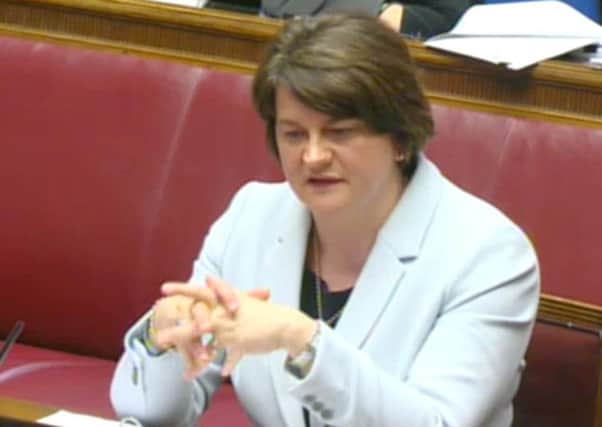RHI claimants’ fury as civil servants move to cut subsidy by 96%


While Arlene Foster was the responsible minister, the Renewable Heat Incentive scheme was disastrously set up as a ‘burn to earn’ subsidy which provided an uncapped incentive for the use of biomass boilers which was higher than the cost of wood pellet fuel.
The proposals unveiled yesterday will involve swingeing cuts which will reduce the earning potential of a 99kw boiler by 96% and may have implications for the far larger GB scheme.
Advertisement
Hide AdAdvertisement
Hide AdRHI claimant Tom Forgrave, a major poultry farmer from Ballymoney, last night told the News Letter: “We’ve been conned. Arlene Foster’s letter to the banks [guaranteeing the payments in 2013] has been worth nothing.”
With huge loans to repay for 10 biomass boilers, he said that for himself and other claimants “it’s going to be hell”.
The emergence of RHI’s gross incentive to damage the environment in what was meant to be an environmentally friendly scheme was the catalyst for the collapse of Stormont amid a series of allegations about the behaviour of some senior DUP figures.
In January 2017, in the dying days of the Assembly, the DUP rushed legislation through Stormont which retrospectively cut the subsidy.
Advertisement
Hide AdAdvertisement
Hide AdThat was only meant to last for a year but was extended for a second year to allow civil servants more time to come up with a permanent solution.
Now, on the eve of the legislation expiring at the end of next month, the Department for the Economy has published its long-term proposal for the scheme.
With no legislature in Belfast, the department is now hoping that Secretary of State Karen Bradley will take the legislation through Westminster in what would be another act of direct rule.
Because civil servants have taken so long to come up proposals, the legislation now must be passed suddenly with limited democratic scrutiny – or else most payments under the scheme would no longer have any statutory basis.
Advertisement
Hide AdAdvertisement
Hide AdAlthough it is known that there was abuse of the scheme, the department has still not inspected every boiler to establish if it is being operated legitimately.
However, most of those on the scheme were operating legitimately, entering a scheme which the government promoted to them and which in a letter to banks and elsewhere Mrs Foster personally guaranteed would never be altered retrospectively.
What civil servants – who are now operating without any democratic accountability – have published will mean further radical retrospective cuts to what claimants receive.
Tariffs for 99kwh boilers – the overwhelming choice because they were the most lucrative – which at the end of 2016 were 6.5p/kwh will now be slashed to 1.7p – a fall of 73%.
Advertisement
Hide AdAdvertisement
Hide AdBut that rate will only be paid for the heat produced if the boiler is run for 15% of the year. Any use beyond that will receive no subsidy. That means that overall the potential earnings from a 99kw boiler have been slashed by about 96%.
Under the old scheme, there was a perverse incentive to waste heat by running the boiler round the clock. Individuals who rarely turned off their boiler during a year would have received more than £55,000.
Calculations from the Renewable Heat Association of Northern Ireland (RHANI), which represents the majority of boiler owners, show that under the original scheme a boiler owner who ran their boiler for about half the year – usage which is not uncommon for poultry farmers or others who have high heat needs – would have received almost £30,000.
Under the retrospective cut to subsidies which the DUP rushed through Stormont in January 2017 that fell to just over £13,000. Under the current proposals, payments would fall to just over £2,000 a year.
Advertisement
Hide AdAdvertisement
Hide AdBy contrast, biomass boiler owners in the rest of the UK are receiving vastly higher subsidies.
And the Republic of Ireland is about to launch a renewable heat incentive which will also involve subsidies which are massively more generous than what Stormont is now proposing.
There will be a voluntary buyout option for those who do not want to stay on the scheme. However, it will offer a small payment – calculated as a 12% rate of return on the additional cost of installing their boiler, minus the payments already received. Civil servants expect most of those on the scheme to continue claiming even when the payments are slashed.
For small biomass (less than 20 kw) the new tariffs will be 7.4p/kwh for the first 1,314 hours and then 1.8p. There are just 12 boilers in that category.
Advertisement
Hide AdAdvertisement
Hide AdThe main category – boilers up to 99kw – will see a flat-rate 1.7p/kwh.
Boilers of up to 199kw – mostly those who entered between cost controls in November 2015 and the scheme’s closure in February 2016 – will have a flat tier of 1.2p/kwh.
The department is also proposing to alter another aspect of a scheme which it originally promised would never be altered. Civil servants are planing to change rate of inflation used to calculate annual increases in tariffs from RPI (which is higher) to CPI.
Richard Rodgers, Head of Energy at the Department for the Economy, said that he expected people with RHI boilers to continue using them. He said: “Biomass is the lowest cost fuel in the market today, it’s cheaper than the alternatives.” Mr Rodgers was not involved in the setting up of RHI.
Advertisement
Hide AdAdvertisement
Hide AdMr Forgrave, a founding member of the RHANI group, said that he and his fellow claimants were “absolutely furious” at what had happened.
Not a single civil servant involved in any of the multiple failures around RHI has been disciplined and several of them have since been promoted.